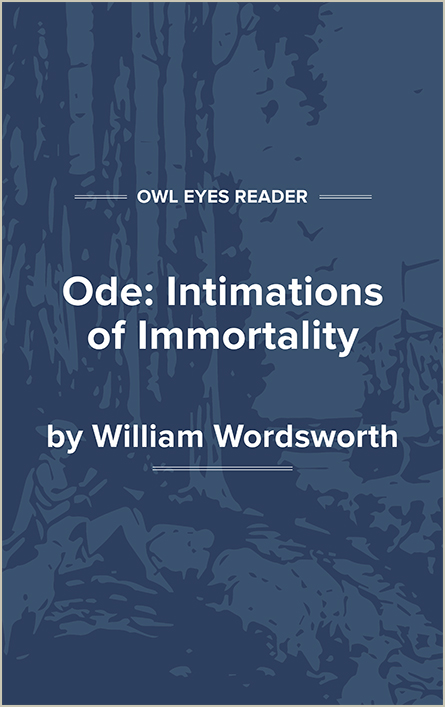Study Guide
Analysis Pages
Summary
“Ode: Intimations of Immortality from Recollections of Early Childhood” is a personal poem in a traditionally impersonal, formal verse form of eleven stanzas that vary in length and metrical design. Wordsworth uses the ancient Greek Pindaric ode, which had celebrated the virtues of athletic heroes, to examine the strangely compelling process of growing up from childhood to adult maturity. The hero is a child, but the victory is won by the adult who reflects upon childhood’s losses.
The epigraph of the poem states the paradox that childhood experiences provide the background and source of the adult’s identity, as if a child could be the parent of the adult who develops from childhood. The poet, recognizing that this is so, wishes therefore to be naturally faithful to his past, to build his maturity upon a continuous line of connections with his youth.
The first four stanzas express the poet’s strange experience of feeling wonderful on a lovely spring morning in May, when all nature celebrates a rebirth of vegetable and animal life. The poet sees and hears the signs of this rebirth, and he can even feel a stirring of sympathetic identification with the vitality all around him. Yet he also feels a disturbing emotion that shadows the bright landscape. He feels that there is something missing in his own being, that the natural scene does not have the same glorious promise that it had when he looked at it as a child. The rest of the poem is an attempt to identify what is missing and to recover it if possible.
Stanzas 5 through 8 recall childhood as if it were like the dawn of a new day, when the sun peers upon the earth through glowing clouds. The meaning behind the comparison is that a child comes from darkness and awakens to life with a vision still colored by its origins in eternity. Like the sun, a child moves from an exciting, hopeful dawn of life, rises toward the common light of midday’s adulthood, and casts shadows that, like a prison, seem to surround a person and block the vision of glorious origins. Human life is also compared to a foster child who is under the care of Mother Nature until it is time for the child to leave home and be independent of the fostering environment. Real parents teach their children games of role-playing, which prepare them for adult responsibilities, but those same games (which later concern marrying, working, and dying) drive children further away from their infant experience of immortality and omnipotence. Finally, the process of growing up is compared to putting layer after layer of ice over a glowing, energetic fire.
The last section of the poem, stanzas 9 through 11, turns from the desolation that ends stanza 8, where the poet sinks beneath the frigid thought of a buried vitality. Suddenly, he realizes that there is something still burning beneath the ice of experience and mortality; he feels an ember of energy remaining from childhood’s vitality. Ironically, the feeling of something missing from his joy at the opening of the poem has become a feeling of something present beneath his dejection in the middle of the poem. The question that he poses for himself is to wonder what this is that still lives deep inside him, what this is that refuses to die. There is the reason for the title of the poem: a...
(The entire page is 857 words.)
Owl Eyes subscribers get unlimited access to our expert annotations, analyses, and study guides on your favorite texts. Master the classics for less than $5/month!

